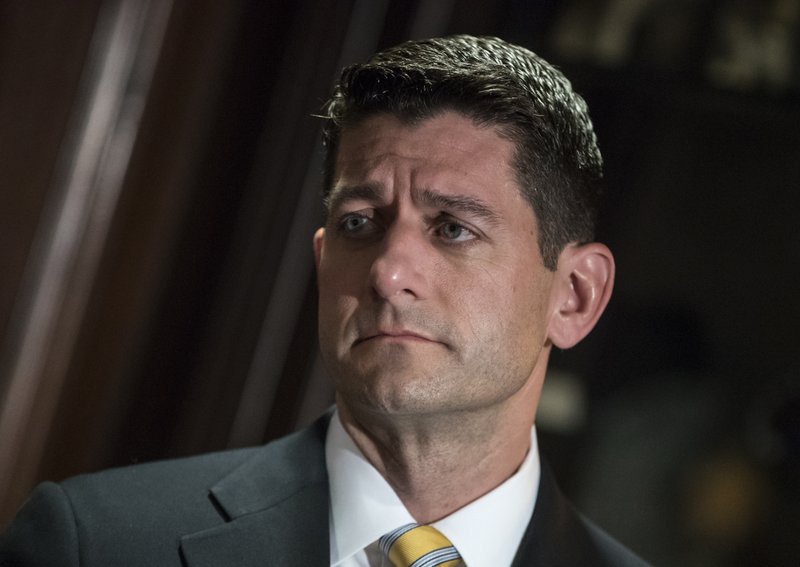WASHINGTON -- Uncertainty over the future of health care for millions of people grew deeper Monday as insurers released a blueprint for stabilizing wobbly markets and the Trump administration left in limbo billions of dollars in federal payments.
At the federal courthouse, the administration and House Republicans asked appeals judges for a 90-day extension in a case that involves federal payments to reduce deductibles and copayments for people with modest incomes who buy their own policies. The fate of $7 billion in "cost-sharing subsidies" remains under a cloud as insurers finalize their premium requests for next year.
In requesting the extension, lawyers for the Trump administration and the House said the parties are continuing to work on measures, "including potential legislative action," to resolve the issue. Requests for extensions are usually granted.
"We continue to work with the Trump administration on a solution," said AshLee Strong, a spokesman for Speaker Paul Ryan.
[INTERACTIVE: Compare new health care bill with Affordable Care Act]
Insurers responded to the administration's delay by emphasizing how the uncertainty has been harming the health insurance market.
"We need swift action and long-term certainty on this critical program," Cathryn Donaldson, a spokesman for America's Health Insurance Plans, the industry's main trade group, said in a statement. "It is the single most destabilizing factor in the individual market, and millions of Americans could soon feel the impact of fewer choices, higher costs and reduced access to care."
Hours before the administration and House Republicans' filing, a major insurer group released a framework for market stability that relies in part on a continuation of such subsidies.
The BlueCross BlueShield Association represents plans that are the backbone of insurance markets under the Patient Protection and Affordable Care Act and would also be the mainstay with a Republican approach.
As the GOP-led Congress works on rolling back major parts of former President Barack Obama's law, the BlueCross BlueShield plan called for:
• Continued protections for people with pre-existing medical conditions and sustained federal funding to offset the cost of care for the sickest patients.
• More leeway for states to experiment with health insurance benefits, with a basic floor of federal standards.
• Preserving Affordable Care Act consumer safeguards including no lifetime caps on benefits, no higher premiums for women based on gender, and a requirement that insurers spend a minimum of 80 cents of every premium dollar on medical care.
• Penalties such as waiting periods for people who fail to maintain their coverage. Republicans want to repeal the Obama-era tax penalties on uninsured people deemed able to afford coverage.
• Significant federal funding to subsidize premiums and out-of-pocket costs.
"There needs to be sustained federal funding," said Justine Handelman, policy chief for the insurer group. "It's critical to ensuring overall affordability."
About 20 million Americans purchase individual health insurance policies, with more than half using the Affordable Care Act's markets, which offer income-based subsidies for premiums and out-of-pocket costs.
The Trump administration has sent mixed signals, and the White House is now saying it needs more time to decide on the cost-sharing money. Without those subsidies, experts say, premiums could jump about 20 percent in 2018.
The cost-sharing money is embroiled in a lawsuit originally filed by House Republicans. Democrats call the whole thing a cynical ploy.
"In merely delaying their suit, Republicans cynically continue to sow uncertainty in the health coverage of millions of Americans," House Democratic leader Nancy Pelosi of California said in a statement. "At a critical period when insurers are deciding premiums for next year, Republicans are pouring uncertainty into the health insurance marketplaces."
The top Senate Democrat echoed Pelosi's concerns.
"Clearly by today's action and their decision to make the next payment, the White House realizes that eliminating cost-sharing reduction payments would cause chaos in the markets, and they would get the blame," Sen. Charles Schumer of New York, the Democratic leader, said Monday. "Unfortunately, by kicking the can down the road once again, the administration is continuing to sow uncertainty in the markets that will hurt millions of Americans."
The case is on appeal after a lower court ruled that the government lacks constitutional authority to make the payments because Congress failed to specifically approve them in the Obama-era health overhaul legislation. Democrats argue that is based on a faulty reading of the law. They also say House Republicans have no legal right to bring the case.
Both the Obama and Trump administrations have kept making monthly payments while the case is pending.
But President Donald Trump at times has suggested he'd stop, publicly musing that could force congressional Democrats to negotiate.
"You know when people say, 'Oh, Obamacare is so wonderful,' there is no Obamacare, it's dead," Trump said in a recent interview with The Economist magazine. "Plus we're subsidizing it, and we don't have to subsidize it. You know if I ever stop wanting to pay the subsidies, which I will."
The cost-sharing subsidies are available to customers with incomes up to two-and-a-half times the federal poverty level, or about $30,150 for an individual, $61,500 for a family of four.
The BlueCross BlueShield message may find a receptive home with Senate moderates in both parties, said industry analyst Sheryl Skolnick.
"There is a caring aspect to this that is mutually beneficial, helps the individual and helps the company," said Skolnick, of Mizuho Securities USA LLC. "Yeah, it's about making money and providing the service, but it's also about coverage."
The court case is known as House v. Price.
Information for this article was contributed by Ricardo Alonso-Zaldivar and Tom Murphy of The Associated Press and by Robert Pear of The New York Times.
A Section on 05/23/2017

